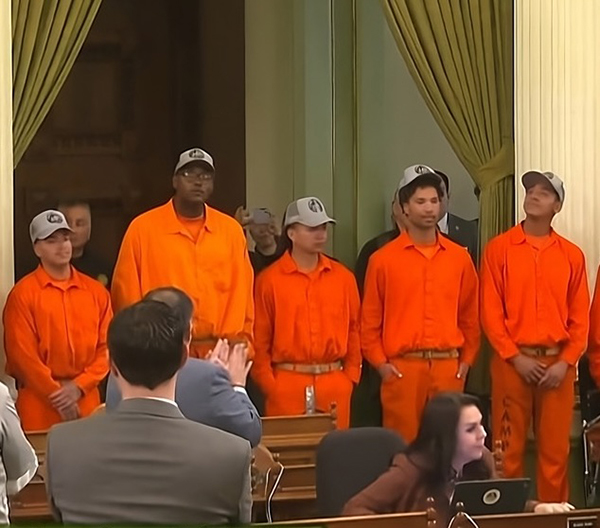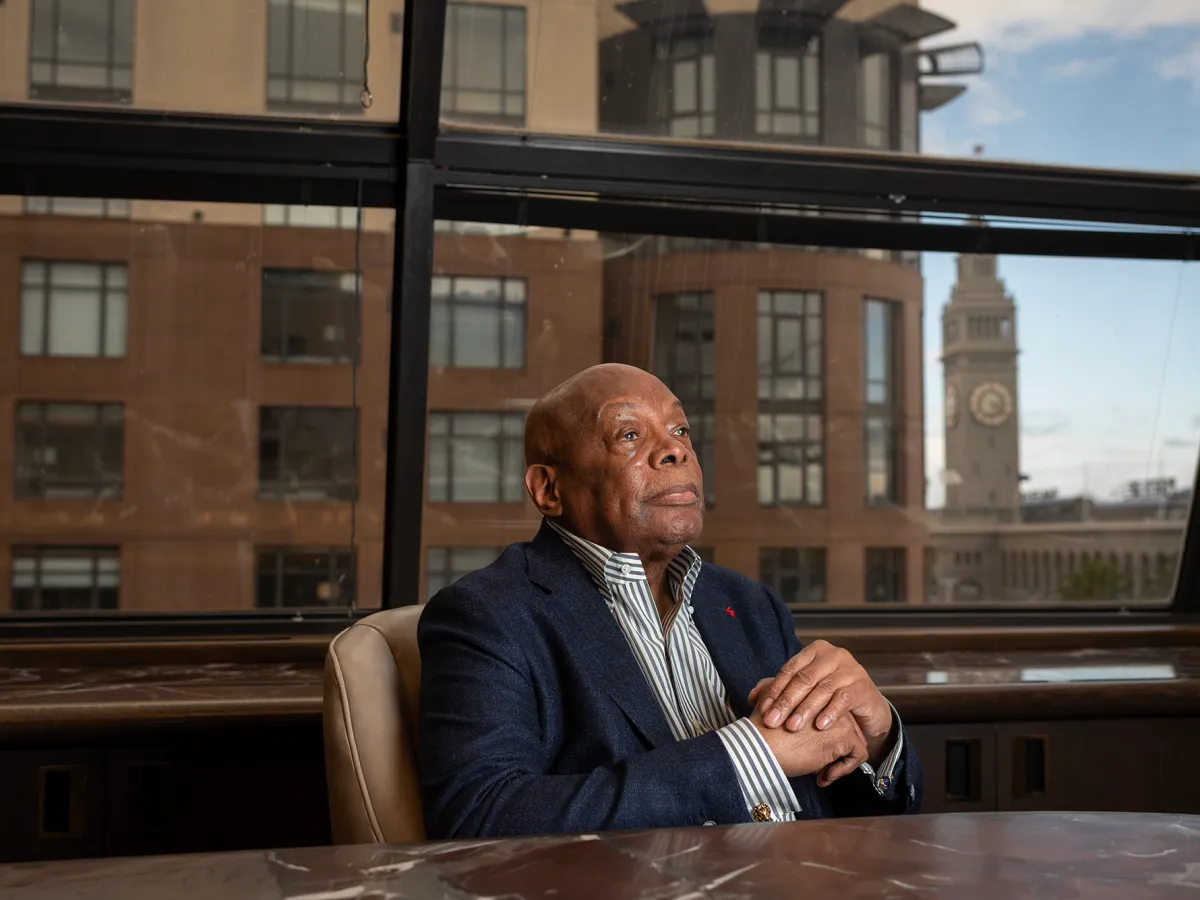Advocates target Black Caucus after governor’s vetoes

Coalition for a Just and Equitable California member Chad Brown speaks in front of the California State Capitol last January before a group of reparation activists. Brown is angry with the California Legislative Black Caucus for not doing more to get reparation measures approved and signed into law.
Photo by Antonio Ray Harvey
By Antonio Ray Harvey
Contributing Writer
SACRAMENTO — Over the last two legislative sessions, Gov. Gavin Newsom has signed 11 of 30 reparations-focused bills authored by members of the California Legislative Black Caucus.
However, last month, the governor vetoed five key bills among 16 other reparation-focused bills in the “Road to Repair” package that caucus members introduced in the Legislature this year for their colleagues’ consideration.
Advocates — already critical of the bills chosen for the “Road to Repair” package — say they aren’t surprised by the governor’s rejection. They are calling on caucus members to include their perspectives in drafting future legislation and to engage more directly with community voices in the next session.
Cheryce Cryer, a Los Angeles-based attorney, community activist and vocal advocate for reparations, told California Black Media that she suggests the caucus members talk to their respective communities about future reparations bills to create policies that are equitable, legitimate and effective.
“I think they need to sit down with the community and say, ‘What is your pleasure’ because they are public servants and they also need to be receptive,” Cryer said. “You cannot put a bill down and say, ‘Come support this.’ I think that’s the wrong strategy.”
Cryer credited caucus member state Sen. Laura Richardson, D Inglewood, for working with the reparations advocacy organization Coalition for a Just and Equitable California to support Senate Bill 515, known as the “Local Government: Collection of Demographic Data” bill.
The bill requires cities, counties and other local governments to use more detailed categories when collecting demographic data about Black or African American employees, starting Jan. 1, 2027.
SB 515 was signed by Newsom, but Richardson’s office did not position the legislation as a reparative justice bill, nor was it a part of the “Road to Repair” package.
The bill made it through the legislative process, partly because Richardson kept advocates and members of the community in the loop, according to Cryer.
“It wasn’t part of the package but just think of what type of impact that it’s going to have,” Cryer said. “Kudos to Sen. Laura Richardson for sitting down and working with CJEC. That’s how it’s supposed to be done.”
Among the bills, Newsom vetoed were legislation aimed at providing tangible benefits, such as housing and educational assistance, to descendants of enslaved people.
Assembly Bill 7, introduced by Assemblyman Isaac Bryan D-Culver City, sought to allow California colleges and universities to consider descendants of enslaved people. Gov. Newsom vetoed the measure, calling it “unnecessary” and noting that institutions already have the discretion to do so.
AB 57 by Assemblywoman Tina McKinnor, D-Inglewood, proposed a loan program for descendants of formerly enslaved people seeking to buy their first homes.
AB 62, authored by McKinnor, would have established a program within the Civil Rights Department to investigate and provide restitution for property wrongfully taken through racially motivated eminent domain.
AB 742, by Assemblywoman Sade Elhawary, D-Los Angeles, focused on licensing requirements under the Department of Consumer Affairs for descendants of formerly enslaved people.
AB 766, authored by Assemblywoman LaShae Sharp-Collins, D-La Mesa, would have required state agencies and departments to conduct racial equity analyses for all new state regulations and budgets. The bill was intended to ensure fairness and inclusion, with a focus on diversity, equity, inclusion and accessibility.
“While the Trump administration threatens our institutions of higher learning and attacks the foundations of diversity and inclusivity, now is not the time to shy away from the fight to protect students who have descended from legacies of harm and exclusion,” Bryan said in a statement after AB 7 was vetoed.
Notable among the bills Newsom approved this legislative session was Senate Bill 518, authored by state Sen. Akilah Weber, D-San Diego. On Oct. 10, the governor signed the legislation that created California’s Bureau for Descendants of American Slavery, the first state agency in the United States dedicated to implementing reparations for Black Americans.
Five years ago, Newsom signed Assembly Bill 3121, which established a nine-member California Reparations Task Force to study the institution of slavery and its harmful effects on African Americans.
In its final report, more than 115 recommendations for how the state should compensate and provide remedies for the harms of slavery and systemic racism were submitted in a 1,100-page report that was delivered to the state legislature in June 2023.
Chad Brown is a reparations activist and leading figure in the lineage-based reparations movement from Los Angeles, is a co-founder of the National Assembly of American Slavery Descendants and a member of the Coalition for a Just and Equitable California.
From Brown’s perspective, all of Newsom’s vetoes on Legislative Black Caucus bills are good.
“It was all good for us because there was nothing good for us in that ‘Road to Repair’ package,” Brown said. “These vetoes, to me, were predictable and a non-event. The only event of it is that it allows us to display how this was never anything intended for our community to be a benefit.”
The Legislative Black Caucus has indicated that it will regroup to bring back bills to push through the legislature in 2026. Cryer and Brown shared their ideas on what would be the path forward to working with the Black lawmakers.
But Brown and other reparations advocates say that over the course of two years, the Legislation Black Caucus may have already missed opportunities to get certain reparations bills over the finish line.
“For next year, 2026, don’t think that [the Coalition for a Just and Equitable California] doesn’t have a plan. We are developing and formulating our plan,” Brown said. “We are still in this legislative fight.”
Antonio Ray Harvey is a reporter for California Black Media.





